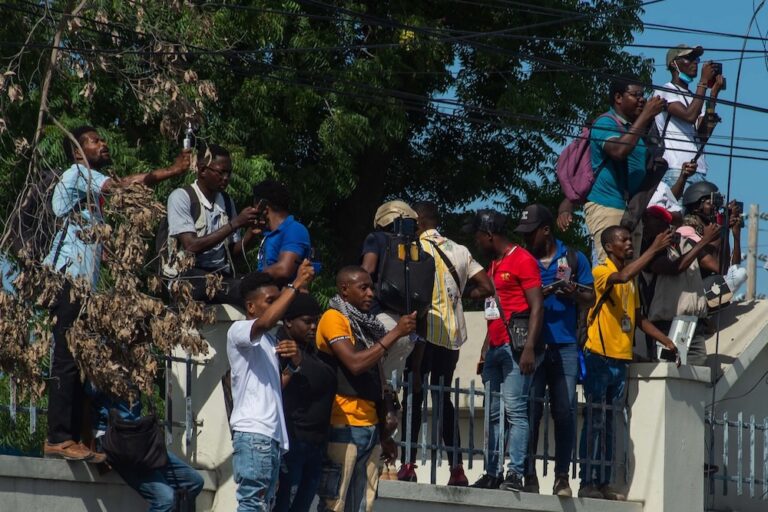(RSF/IFEX) – In a letter to President Jean-Bertrand Aristide, RSF denounced the attacks against media outlets and journalists by government followers who filled the streets to support the government, which was dealing with an attempted coup d’état. “The systematic nature of the attacks demonstrates that the protestors were acting on instructions to attack the press,” […]
(RSF/IFEX) – In a letter to President Jean-Bertrand Aristide, RSF denounced the attacks against media outlets and journalists by government followers who filled the streets to support the government, which was dealing with an attempted coup d’état. “The systematic nature of the attacks demonstrates that the protestors were acting on instructions to attack the press,” stated RSF Secretary-General Robert Ménard. Recalling the case of murdered journalist Brignol Lindor, Ménard denounced the “strategy that seeks to liken the press to the opposition in order to legitimise attacks against it.” RSF asked the president to take all the necessary steps to guarantee journalists’ safety and allow radio stations to start broadcasting their programmes again. The organisation also asked the head of state to order his supporters to cease attacking the press.
Lindor, a journalist from Radio Echo 2000, was killed on 3 December 2001 by individuals who are close to the president’s party, Fanmi Lavalas, after receiving opposition figures as guests on his radio programme (see IFEX alerts of 11, 5 and 4 December 2001). Since October, about thirty journalists have been threatened or attacked by government supporters who accuse them of being critical of the government, according to the Haitian Journalists’ Association (Association des journalistes haïtiens, AJH).
According to information collected by RSF, on the morning of 17 December, at least a dozen journalists, including Agence France Presse (AFP) photographer Thony Bélizaire, Patrick Moussignac, Gérin Alexandre and Jean-Elie Moléus, Radio Caraïbes FM director and reporters, respectively, and AJH President Guyler Delva were assaulted by Fanmi Lavalas supporters who came to support the government, which was dealing with an attempted coup d’état. Following an appeal by the president, several thousand Aristide supporters gathered in front of the presidential palace. The protestors, who were very tense and armed with machetes, sticks and pistols, forced journalists to leave the scene under threat. According to several observers, they accuse the press of being too critical of the government. In addition, two vehicles belonging to the Telemax television channel and Radio Métropole were also attacked in the area surrounding the presidential palace.
Citing threats, Radio Métropole, Radio Vision 2000, Radio Caraïbes FM and Radio Kiskéya, four private stations from the capital, ceased broadcasting for security reasons, while other stations, including Radio Galaxie, Signal FM and Radio Ibo, suspended broadcasts of their news programmes. Demonstrators attacked the studios of Radio Caraïbes, breaking the station’s office windows. Several journalists were threatened by government supporters, who wanted to find out which media outlets they worked for. “We would have killed you if you were a Radio Caraïbes journalist,” demonstrators told Maxeau Exil, from the Haïti Press Network online agency, whom they threatened with a gun. Demonstrators forced Radio Ibo journalist Roger Damas to hand over his press card and cellular phone. They accused Radio Ibo of supporting the opposition. Damas managed to escape his attackers. There was also a gathering in front of Signal FM radio station. Fearing reprisals, several of the station’s journalists reportedly stayed home, according to AJH President Delva. Outside the capital, at least two media professionals were attacked and the Radio Maxima station, which broadcasts in Cap Haïtien (northern Haiti), was forced to suspend its broadcasts.
Demonstrators also attacked the offices of the three opposition organisations Convergence démocratique, Konakom and Kid.
Armed men attacked the presidential palace in Port-au-Prince at dawn. According to the AFP, the attackers were led by Guy Philippe, a former police commissioner who was already accused of plotting a coup in the summer of 2000 and was subsequently exiled to the Dominican Republic and later Ecuador. According to the president’s office, security forces stormed the palace and regained control that same morning.


